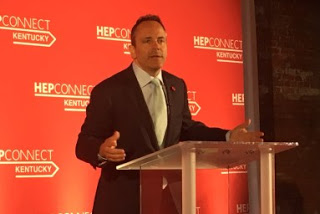“We can’t afford to ignore it,” Gov. Bevin said. (Darla Carter photo)
—–
“A multimillion-dollar effort to fight
hepatitis C was introduced Thursday in Louisville with the help of Gov. Matt Bevin as well as medical professionals and health advocates,” Darla Carter
reports for
Insider Louisville.
The five-year, five-state project in Kentucky and four other states will use screenings, community partnerships and prevention programs, and strengthen the health-care infrastructure to fight the liver disease, Carter reports. The project, called HepConnect, will serve Kentucky, Indiana, North Carolina, Tennessee and West Virginia.
Many people who have hepatitis C don’t know it because it often doesn’t present symptoms, said Derek Spencer, a lobbyist for
Gilead Sciences, the drug maker funding the project. The state of Kentucky estimates that more than 40,000 Kentuckians have the disease, but “The actual number is likely four to five times that amount,” said the state
Cabinet for Health and Family Services.
The opioid epidemic is spreading the hep-C virus, Spencer said: “The majority of new HCV infections in the Appalachian region are attributed to the results of syringe-sharing practices and other equipment associated with injecting drugs.”
Carter notes, “Other ways of acquiring the virus include sharing personal items, such as razors and toothbrushes; getting a tattoo or body piercing in an unregulated setting; or even sometimes through sexual activity.” If the illness goes undetected, it “can progress to liver damage, liver failure, liver cancer and death,” Spencer said.
Research by the federal Centers for Disease Control and Prevention in Kentucky, Tennessee, Virginia and West Virginia showed a 364% increase in the number of acute hep C cases “from 2006 to 2012 among young people, mainly whites living in urban and non-urban areas,” Carter notes.
Gov. Matt Bevin said at the announcement that hep C was once considered a chronic disease of
baby boomers, but we’ve now seen it “leap into younger generations,” he said. “We can’t afford to ignore it.”
Other at the April 25 event “talked about the need to lessen the stigma surrounding hepatitis C and drug use, and a panel of experts from the University of Louisville Hepatitis C Center and elsewhere spoke of the need to address not only the person injecting drugs but also family members who might be infected or impacted,” Carter reports..
“Pregnant women can pass hepatitis C on to their babies,” nurse practitioner Barbra Cave said.
The first year of the project will cost $11 million. “The project is being led by the Harm Reduction Coalition, a national organization that promotes the health and dignity of people and communities affected by drug use,” Carter reports. It has a Kentucky branch.
